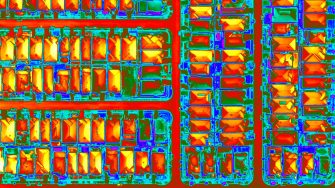
Problem Statement
Regional climate change in cities is the most documented phenomenon of climate change. Higher urban temperatures are documented experimentally for more than 450 major cities in the world. Numerous investigations demonstrate that the mean magnitude of the temperature increase may exceed 4-6°C, while at the peak it may exceed 10°C. The serious increase of the frequency and the strength of heat waves creates strong synergies between the global and regional climate change and intensifies the magnitude of the overheating.
In Australia, it is expected that Sydney and Melbourne will have 50°C+ summer days in the near future, with Western Sydney already reaching 48.9°C in January 2020. Urban overheating can cause a serious impact both on the energy demand and generation sectors. It increases the cooling energy consumption of buildings, rises the peak electricity demand, and obliges utilities to build additional power plants. It seriously affects health issues, particularly heat related mortality and morbidity, impacts the concentration of pollutants and damages the urban environmental quality, and finally deteriorates the levels of local vulnerability and thermal comfort. To counterbalance the problem of urban overheating, developing mitigation policies, appropriate intervention strategies and technologies become an urgent task.
Solutions
The High Performance Architecture (HPA) research cluster comprises the international research leader in the field of urban overheating mitigation. It has also extensive and practical real-world industry experience in responding to the challenge of urban overheating in cities. The HPA team has conducted a wide range of case study investigations of international and Australian cities such as Riyadh (one of the world's hottest cities), Sydney/Western Sydney, Melbourne, Darwin and Alice Springs, as well as developed an innovative Urban Heat Island (UHI) Mitigation Decision-Support Tool and Performance Index. Specific research areas include:
- Analysis of key characteristics of urban overheating
- Impact analysis of urban overheating on energy, peak electricity demand, health, survivability and sustainability, environmental quality and economy
- Urban overheating prediction methods
- Experimental evaluation and assessment of urban overheating
- Development of advanced mitigation technologies
- Cool and super cool materials
- Green infrastructure and evaporative techniques
- Case studies and implementation
- Assessment of the impact of mitigation technologies on energy, peak electricity demand, health, sustainability, environmental quality and economy
Projects
- National Heat Vulnerability Observatory Phase 1 Smart and Cool Places in NSW
- Too hot to play: quantifying the impacts of urban climate change on playground activity
- Cool roofs cost benefit analysis (2022)
- Urban Heat and mitigation potential in Riyadh (2022)
- Fluorescent daytime radiative cooling for urban heat mitigation (ongoing)
- Integrating urban cooling in local government planning provisions (2021)
- Cooling South Melbourne (2020)
- Preliminary design of a smart climatic road in Phillip St Parramatta (2019)
- Sydney’s third city (2019)
- Urban cooling analysis services for South Creek catchment (2019)
- Evidence based interventions for urban cooling project (Blacktown LGA) (2019)
- Menangle park precinct (2019)
- Cooling Sydney Strategy: Planning for Sydney 2050 (2019)
- Urban heat amelioration design guidelines and standards (VIC DELWWP) (2019)
- Assessment of impact of urban development on urban heat island (UHI) coupled with UHI effect of solar PV (2019)
- NSW Government open data visualisation for urban heat island mitigation (2019)
- Microclimate and urban heat island mitigation decision-support tool (2018)
- Improving the present and future climate and microclimate in the City of Parramatta (2018)
- Driving increased utilisation of cool roofs on large-footprint buildings (2018)
- Citizen Science (2018)
- Cooling Western Sydney (2017)
- Heat mitigation program: Darwin, Northern Territory (2017)
- Alice Spring heat mitigation study (2017)
- Guide to urban cooling strategies (2017)
- An investigation into the impact of the urban heat island on the energy consumption and environmental quality of buildings in Sydney and Shanghai (2016)
- Urban micro climates: Comparative study of major contributors to the urban heat island in three Australian cities (Sydney, Melbourne and Adelaide) (2016)
